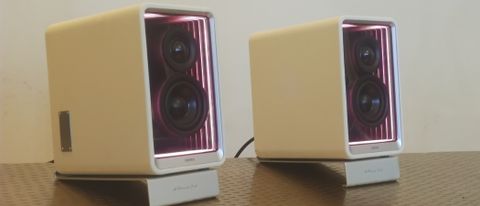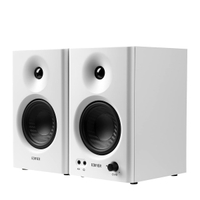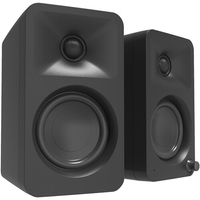TechRadar Verdict
The Edifier QR65 are decent mid-range desktop speakers with a decent amount of bass, a few different connection options and a really attractive look. However, a few issues regarding PC connection make them better suited as multi-media options than standard desktop speakers.
Pros
- +
Plenty of connection options
- +
Bassy sound
- +
Good looking
Cons
- -
No PC app support
- -
Voice issues in movies / TV
- -
Manual turn-on required
Why you can trust TechRadar
Edifier QR65: Two-minute review
It's easy to assume that your desktop computer just needs cheap and cheery monitor speakers so you can hear your email chimes or the sound of the YouTube videos you watch when you're pretending to work, but the Edifier QR65 make a good case as to why you should stretch upwards into the realm of the best stereo speakers.
The QR65 are the newest speakers from Chinese audio company Edifier, which sells plenty of other desktop and monitor speakers for gaming, studios or just general computer use. These new models are classed as part of its 'Wireless Speakers' line-up but it also calls them 'Desktop Active Monitors' so they're clearly designed for desktop use.
I wouldn't recommend buying them solely for desktop use, though, because the Edifier QR65 function much better as multi-media speakers.
The Edifier QR65 are mid-range speakers and the sound fits; it's pretty good, with thumping bass and clear treble, even if the maximum volume won't exactly rock the house (unless you have a small house).
There are a fair few connection options too, as you can connect via USB (that's for the desktop connection) as well as wired and Bluetooth audio, so the speakers really do work for multi-media enjoyment.
And while I'm listing positives, I want to touch on the look of the speakers: they're fashionable and good-looking, even though they have LED lights which will raise red flags for audiophiles (and red LEDs for everyone else).
Then onto the... not 'bad', per se, just 'annoying' bits. While the QR65 have an app for control on your phone, they don't on PC, which feels like an odd omission given that these are meant to be desktop speakers. They also don't turn off or on with your computer, so you have to keep manually turning them on and off when you want to use them or contend with their LEDs lighting up your room all day and night.
Because of these two hurdles I ended up preferring to stream music over Bluetooth during the testing period, rather than testing them alongside my Windows PC.
Edifier QR65 review: Price and release date
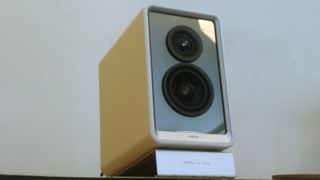
- Announced in April 2024
- Mid-range at $369.99 / £329.99 / AU$449
Edifier announced the QR65 in April 2024, to join its busy range of audio products.
The Edifier QR65 cost $369.99 / £329.99 / AU$449, and they’re generally considered to be towards the low end when it comes to desktop speakers. Sure, you can find Amazon cheapie options for a tenth of the price, but you can also find many options for ten times that cost (or more, see the KEF LS50 Wireless II). They’re also snugly in the middle of the options on our list of the best computer speakers.
Another thing this price puts the Edifier QR65 roughly in the middle of? Edifier’s range of speakers – Edifier has a lot of speakers in many categories such as bookshelf, computer or studio speakers, and the QR65 are actually part of its wireless speaker range, despite being designed to work with desktops.
If you want to see what else is at this price range, specifically when it comes to dual-speaker desktop set-ups, then the Kanto Ora4, FiiO SP3 and Audioengine HD3 all hover roughly at this price point.
Edifier QR65 review: Specs
| Drivers | 1.25-inch tweeters, 2.75-inch mid-low drivers |
| Connectivity | Bluetooth 5.3 |
| Frequency response | 55-40,000Hz |
| Connections: | Bluetooth, AUX, USB |
Edifier QR65 review: Features
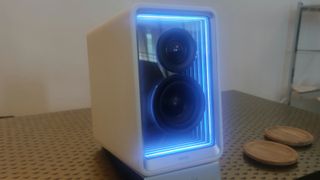
- Phone app, but no PC one
- LED lights with customizable effects
- Audio cable, USB and Bluetooth connections
If you’re connecting the QR65 to your smartphone, you’ll need to download the Edifier ConneX app to control them. Not Edifier Connect, nor Edifier Home, nor Edifier Enhance, and I had to deploy the trial and error approach when working out which app to use, which was an annoying waste of 10 minutes. Sure, Edifier isn’t the only tech company which refuses to consolidate its apps, but that doesn’t excuse it.
ConneX lets you change the EQ of music, customize the light effects and change the audio codec of streamed music, amongst a few select extras. You can certainly use the QR65 without it, but there’s no harm in exploring these extra features.
So what about if you’re using these desktop speakers while paired to a desktop PC or Mac? Well then you’re out of luck, because there’s no app support when you’ve got the QR65 hooked up to your computer by Bluetooth. You can use the dial to change the light effects a little but there are no EQ options, and if you want to turn up the volume, you’ll have to reach over to the speaker and turn up the dial manually (if you’re already at 100% PC volume, that is).
That’s why I said in the introduction that these speakers fare better as general multimedia speakers than desktop-exclusive ones; if you only use these connected to a computer, you’re going to miss a few features. The exception is if you connect the speakers to your computer and your phone, which lets you use the latter to equalize and change light effects, but that’s a lot of faff.
One other thing to bear in mind when using the Edifiers as your desktop speakers is that they don’t turn off or on with your computer – you’ll need to remember to separately turn them off or on, which is something I was constantly forgetting.
The other form of connectivity is via audio cable, with RCA plugging into the speakers and a 3.5mm jack to connect to your phone, MP3 player or other device. Pretty straightforward. Talking of connectivity, there’s actually a Sub Out port in one of the speakers that you could use to connect to an external subwoofer if you want more bass than the Xtreme Bass Series. I don’t see most people needing this, but it’s a nice optional extra.
- Features score: 3.5/5
Edifier QR65 review: Design
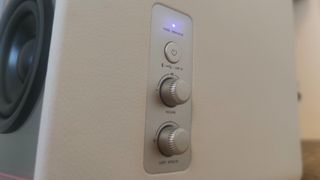
- Two good-looking rectangles
- Stands included in box
- Dials and ports in one speaker
The Edifier QR65 consists of two fairly large speakers, with one measuring 13 x 21.3 x 21.2 cm and the other a touch bigger due to it having extra dials and ports. This latter is the ‘active speaker’ which you use to control the music and connect to power and inputs/outputs, while the former is the ‘passive speaker’ which only has a port to connect it to the active speaker. Yes, they're actually 'powered' speakers even if they're listed as 'active', since the amplification is squirrelled into one of the boxes.
Setting up the Edifier is a little bit of a faff but once you’ve connected the active speaker to power, the passive speaker and your PC (via USB-A cables), Bluetooth device (via Bluetooth, obviously) or other audio device (via ports in the back and an included cable), and also directed the speakers towards you (using included stands, which sit at a 10-degree angle) you’re ready to go.
As well as the aforementioned ports, there are three charging ports which you can use to power up other devices (one USB-A and two USB-C) which is a handy extra feature.
On the right side of the active speaker is a button and two dials. The button is to switch between inputs (each press toggles you between Bluetooth, USB and Line In) and to turn off the speakers by pressing and holding. I ended up leaving them on though, to save myself the journey of going into my computer settings to change the active output.
Then onto the two dials: the first is for volume which is pretty self explanatory, though pressing it also pauses or plays music. The lower dial is for changing the light patterns of the speakers: turning it increases or lowers the brightness, and pressing it toggles between various patterns for the lights to display.
Oh, did I not mention the lights around the front of each speaker? That’s because of the (earned) stigma around LED lights in speakers, with many audiophiles assuming that they incur noise and indicate a probably bad-sounding product. That’s not a wrong assumption, but it’s not applicable in this situation, as the sound quality section describes. Saying that, I’m not sure the LED lights add much to the QR65, beyond the novelty factor.
I’m a big fan of the white version of the speakers I tested (there’s also a black version but it’s a little more bland, in my opinion). The clean-looking shell contrasts with the silver dials and the black front in what is a fairly minimalist boxy look (apart from the LEDs). If you’re a Mac user who insists on having a fashionable svelte desktop, these could well fit into your set-up better than most rival options.
- Design score: 4/5
Edifier QR65 review: Sound quality
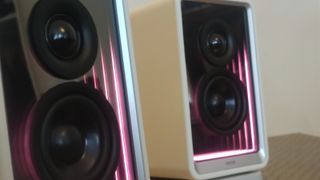
- Full sound with lots of bass
- Lots of codecs and Hi-Res certifications
- Max volume could be louder for certain use cases
Each unit of the Edifier QR65 consists of a 1.25-inch dome tweeter and a 2.75-inch mid-low driver, and together they provide a nice warm sound.
When listening to music, you’re getting a sound that’s nice and bassy, though that’s not to say you’ll struggle to hear treble sounds. That’s not quite true of the mids, which do fall through the cracks a little bit, as does sub-bass. But that’s why you can plug a subwoofer into the speakers!
Playing games, the full-bodied sound works well for creating a layered soundstage – I could hear the background hum of cities and the echo of damp dungeons all around me.
The bassy emphasis was more noticeably when watching TV or movies, as it meant voices occasionally sounded a little low and muffled – they’d often blend into the rest of the mix a little, and I lost a few lines of dialogue in shows as a result.
If you’re using the Edifier QR65 as your PC speakers, you’ll find the 70W power output more than adequate. I played PC games with them and even at medium volumes, I was surrounded by sound – the shriek of an enemy behind me in Lords of the Fallen nearly gave me a heart attack when I thought it was something behind me in real life!
That’s not quite the case if you’re using these as general media speakers, as even at their maximum volume the QR65’s sound didn’t fill my living room – I wouldn’t recommend buying these in lieu of a TV soundbar or a set of tower speakers for your hi-fi system.
Depending on your audio input, you can enjoy listening with LDAC codecs, Hi-Res Audio or Hi-Res Audio Wireless certification, and that all means that you can enjoy great-sounding music whether you’re using Bluetooth 5.3 to connect your smartphone, are plugging in an aux-cord or have plugged the Edifiers into your computer.
- Sound quality: 4/5
Edifier QR65 review: Value
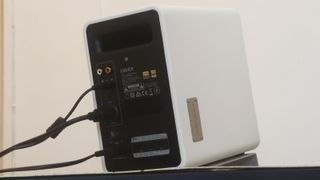
- Good value for money as a multimedia option
- … but they definitely aren't for everyone
You're emphatically getting your money's worth with these Edifiers. They look good, provide decent music quality, all things considered, and do work well as jack-of-all-trades options for desktop, Bluetooth and wired audio.
However, if you just want any old speakers for your desktop, these are overkill. For workplace computers or on devices you won't use for multimedia entertainment, you don't need speakers that cost this much. If that's all you need, you might try looking for inexpensive speakers that cost a third (or less).
- Value: 3.5/5
Should I buy the Edifier QR65?
| Attributes | Notes | Rating |
|---|---|---|
| Features | A range of connection options, though no PC app or controls. | 3.5/5 |
| Design | An attractive design, despite the LEDs. | 4/5 |
| Sound quality | Sound good for the price, with a warm sound. | 4/5 |
| Value | You get what you pay for, if you need it. | 3.5/5 |
Buy them if…
You'll want to jump media types
If you need speakers that can light up your computer but also function with your phone, tablet or laptop, you'll enjoy the QR65's versatility.
You want good desk 'vibes'
Creating an aesthetically-pleasing work environment is important for some people, and if that's you, the QR65 are attractive enough to fit into most plans.
Don’t buy them if…
You're not an LED fan
Lots of audiophiles avoid products with LED lights, due to connotations of poor quality and the often garish looks they can provide.
You want room-shaking sound
The Edifier QR65 goes loud, but it doesn't go LOUD, so if you want something that'll annoy the neighbors you'll need something louder (or simply annoying nighttime wandering habits).
Edifier QR65 review: Also consider
Edifier MR4
Cheaper alternatives from Edifier, the MR4 don't compare in the bass end but overall they sound pretty good, and they maintain the same colors as the QR65.
See our full Edifier MR4 review
Kanto Ora
These Kanto speakers are highly-rated and cost a similar amount to the Edifier. Their sound profile is similar too, but these don't have LEDs and they're reference speakers with great sound.
See our full Kanto Ora review
How I tested the Edifier QR65
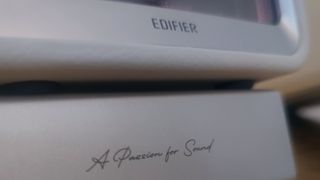
- Tested for over two weeks
- Tested at home connected to phone and computer
The testing process of the Edifier QR65 was just over two weeks.
About half of the testing process was done with the speakers connected to my Android phone via wired and Bluetooth audio, for music streaming. I streamed from Spotify, YouTube and briefly from Netflix during this time.
For the other half I connected the speakers to my custom-built Windows PC using the USB port, and used it for watching movies and TV shows and playing video games on my computer.
I've been reviewing devices for TechRadar for over five years now, a time which has seen my test speakers, headphones, earbuds and gaming peripherals, including a previous gadget from Edifier.
- First reviewed in June 2024

Tom Bedford was deputy phones editor on TechRadar until late 2022, having worked his way up from staff writer. Though he specialized in phones and tablets, he also took on other tech like electric scooters, smartwatches, fitness, mobile gaming and more. He is based in London, UK and now works for the entertainment site What To Watch.
He graduated in American Literature and Creative Writing from the University of East Anglia. Prior to working on TechRadar, he freelanced in tech, gaming and entertainment, and also spent many years working as a mixologist.
